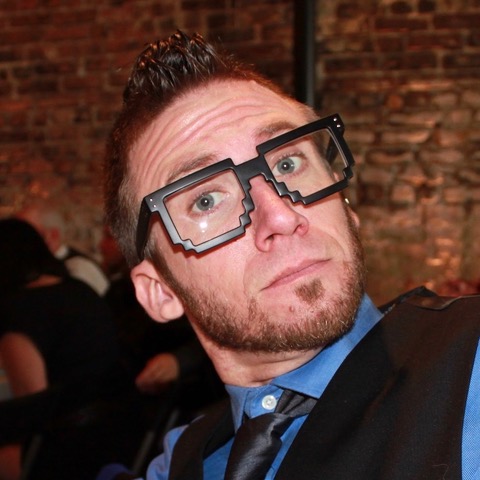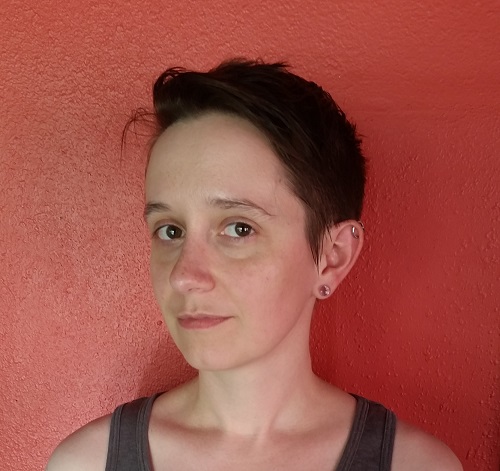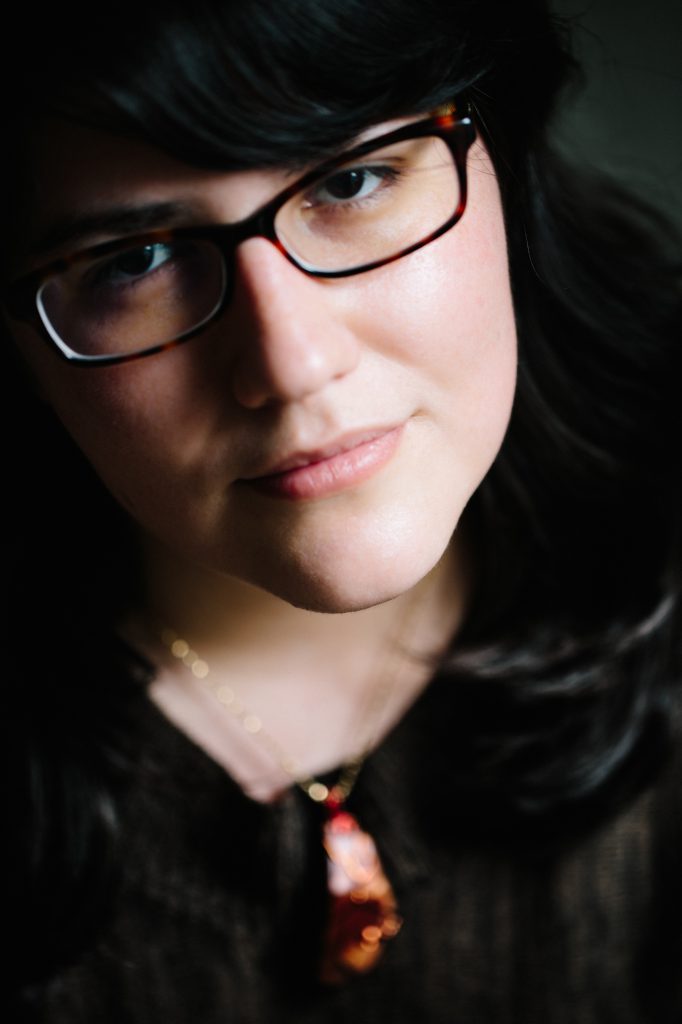edited by Hal Y. Zhang
Content note (click for details)
Mass atrocitiesDate: March 10
Hours worked: 8.0
Project: Mama’s Pizza & Pasta
I unmade Mama’s Pizza & Pasta today. Single-story, painted brick exterior, swaddled in garish holiday lights all year round. Same two wrought-iron tables chained out front that I used to pass on my way home from Redondo High, where the old-timers would knock back Morettis and dole out dirty jokes on Friday afternoons. Same Mama, too. Poor lady.
In the cold confines of the unmaking chamber, I donned my gear. Oculars to get me there metaphysically, a wraith on the astral breeze; wrought iron needles to tease out the loose threads of reality; hexed gloves to rip that shit apart. I started from the top, like you taught me. The rooftop exhaust fans, sticky from decades of congealed grease. The rust-gnawed floodlights, the decrepit polyurethane sign—along with every memory of every person who’d ever glanced up at it—backdropped by imported palm trees and a smoggy orange moonrise.
Then, with a flick of my hand, the roof. All the furtive moments from all the high school lovers who made out up there in the midsummer heat. Gone. Then the walls, brick by brick, paint chips flecking from the vanishing surface like pastel scabs.
The kitchen was a labor, all those outdated appliances wheezing in the summer heat. Like you said at orientation, old things are hard to forget. So I pried off my oculars and hit the vending machines. By 2 a.m., the kitchen had never existed. I swept through the dining room on a swell of Mountain Dew-induced adrenaline, vanished the foyer without a conscious thought.
I saved the two tables out front for last. Wish I hadn’t. Like you said on day one: biggest risk in this business is nostalgia.
Anyway, the tables are gone.
And for what? What did Mama do to deserve this? Was it something she said in an interview? A politician she snubbed? A customer she refused to seat?
I’ll never know. Can’t know, by design. The coin-op laundromat is shouldered up against the boxing gym now—not an inch of her old curb-space as proof to the contrary. No hard feelings, right? She’ll be back from holiday tomorrow, won’t ever know what she missed. She’s spent her whole life waiting tables at Gino’s, now, never took a chance on her own business. Mama’s Pizza is gone and nobody’s the wiser.
Nobody but me, for a few more minutes. I can’t help but relish the fleeting privilege of being the only person on Earth who knows that which has never been. By the time I hit the street, I’ll be just like everyone else. A lowly worker navigating a tidy world, oblivious to the gloved hands that tug at threads in my periphery.
When it was done, before I pried off my oculars I swept the block for loose ends. A pizza box skidded along the sidewalk, cruel trick of the pre-dawn breeze. Across the street, in the reflection off the laundromat windows, staring at that fleeting singularity where Mama’s never stood: you. Notebook clutched in your hand, scribbling.
By the time I turned, you were gone.
Just like Mama’s.
***
Date: March 22
Hours worked: 8.0
Project: Perry Park
I’ll be glad to forget today.
I walk past Perry Park every morning. Used to shoot hoops there, back in junior high. Those old chain nets were so satisfying, the way they throttled the ball before letting it pass through, defying time for a single glorious moment.
What will I remember after I’ve clocked out? You say that when a thing gets unmade, the memories don’t leave a void—they transfigure. Details get slippery, new flesh grown over old wounds. Friendships unravel. Blame gets reassigned; prejudices are reborn. The world forgets a piece of itself. What did I used to do after school? Play basketball. Where did I play? The park. You know, that park.
Same for faces. Like the old man on the bench by the hoops. Sorry, guy. Just following orders.
Still, never unmade a person before.
Or have I? How do I explain those dreams, haunted with faces so familiar yet wholly unknown? A brother, a boyfriend, a daughter they never had. Only way to hang onto the unpast is to smuggle your oculars outside, catch an unmaking in progress. But nobody’s that stupid: the unfactory’s punishment for nostalgia is unerring and swift. At least my own past is protected by contract. Aside from incidental details like Perry Park.
I saw you there before work, in the reflection of a passing windshield, kicking around the baseball diamond where the big kids sling dope. Keeping tabs on me in your notebook.
I did the job, boss. Old man’s gone. His nephews never had an uncle, his partner never married.
Now leave me the fuck alone.
***
Date: March 24
Hours worked: 4.0
Project: Rudolph
It shouldn’t matter. They say dogs don’t have souls, that those droopy wet eyes aren’t sad at all but rather our own tragic compulsion to transpose human emotion onto everything we see. These vanity breeds only live seven years anyhow, and fuck you I’m a cat person.
Fuck you, I’m a cat person.
I only need to type it a few more times, and the hangover of memories will be gone from my mind just like they are from Rudolph’s doting humans, and everyone else besides. I shouldn’t have to type it at all, really, because it’s like you said on day one: can’t be sad about losing a thing that was never there. And a dog, to quote my old neighbor, is—
Now, that was unexpected. I probably shouldn’t be writing this part down, but you taught me to be ruthless with documentation. The deed is done: Rudolph the Dog is no more, unspun from the scraggly end of his tail to the tip of his side-lolling tongue. It barely took half of a shift. My mind had already begun the process of remolding itself when the thought I was typing fell right out of my head. When I glance back at what I wrote, it makes no sense at all. What old neighbor? Someone with a dog, I assume, but beyond that…who knows?
A chill runs through my body. I wrack my brain, but it’s no use. It’s okay, though. Just another incidental detail.
Besides, I’m a cat person.
***
Date: March 30
Hours worked: 9.0
Project: Park Manor
Today I unmade Park and West 170th. Strapped on the oculars, pulled the gloves over my trembling hands and vanished a city block. Soup kitchen, pawn shop, four-story affordable housing complex. My biggest project to date, maybe.
The tenants at Park Manor are gone. I work graveyard, so most everyone was asleep. The ones who were out—at the bar or working late shifts—they’ll make my list tomorrow. The unfactory never leaves anything to chance. The ones that were there, I found the loose thread in each of them. Unwove their skin, reclaimed their bones, snuffed out their hearts one by one. Pretty sure the lady in 3C was my sixth-grade English teacher. Can’t be missed if you never existed.
Isn’t that right, boss?
But how many incidental details have I already lost? Why do I search for my car keys when I don’t have a license? Should I remember the name of my first love, or what I wanted to be when I grew up? The faceless mobs that haunt my dreams—are they shadows of an unpast I’ve already erased?
In a tooth of glass from the pawn shop’s busted window, through my oculars tonight, I spotted your reflection. You moved like a listless wraith.
In your eyes I saw the truth.
***
Date: March 31
Hours worked: 9.0
Project: Unfactory, South Bay Branch
The city is emaciated. Gaunt. Hollowed out.
Of course, I have no basis for comparison. The things I unmade were never here. Sure, in some archived unpast maybe there was a bakery wedged between that laundromat and that boxing gym. But that’s neither here nor there. And yet, the seams of this place feel overworn. The streets sag against the weight of people they never held.
Fuck it. Our work here is done. The purpose of it all—whether we succeeded or failed—I’ll never know. I unmade the facility today from a mobile chamber across the street. They’re transferring me up north. New digs, fresh faces. They need a veteran to hold down the line. It’s a dangerous path to walk, between experience and liability. Sooner or later, the risk of a lingering memory will outweigh my upside. Old things are hard to forget.
Isn’t that right, boss?
I followed you home last night, on a hunch. Dusted your prints from the keypad, let myself in while you slept. Found your notebook under your pillow. All this time, I thought you were keeping tabs on me. Waiting for me to slip up. You never liked me. Said I lacked humility. Called me ruthless, as if I wasn’t doing exactly what you’d taught me. All this time, I thought you were trying to unmake me. Until yesterday, when I caught a glimpse of you in a reflection.
Wearing your oculars.
There’s only one reason you’d have your gear outside the chamber, and it isn’t to forget. Only one reason that notebook of yours would be warded against unmaking, all frayed and reality-stripped at the edges.
You’ve been keeping secrets. Grasping at threads of the unpast. Tasting that forbidden fruit, nostalgia.
I get it. Really, I do. I’ve been feeling it too, in the dead space between my thoughts. All those incidental details. When we’re made to forget, it isn’t to clear room for new things. We become lesser versions of ourselves. Maybe someday I’ll be the one haunting the reflections of the unmade. Scrounging for memories of a better past, with familiar smiles and unfamiliar names. But not today.
You see, I read your notebook. The lists, the addresses, the profiles. Everything you’ve directed me to unmake. All the incidental connections to my own life. Every street, building, and park. Every dog, every person.
A brother.
A boyfriend.
A daughter I never had.
Not very incidental after all. Maybe nothing is. The contract is well-crafted bullshit, I guess, and your notebook is more than nostalgia. It’s a confession. It’s everything you took from me, bound up and tucked under your pillow so you can sleep at night. It’s a blueprint for the monster you crafted of me. A monster to do your bidding, to keep your own hands clean.
Problem is, you crafted me too well. So of course I sliced a warded sheet out of that notebook, made sure it found its way into the evidence drawer posthaste. You know I’m ruthless about documentation.
I checked the logs before I strapped on my oculars today. You were the only one on-site, and there was no evacuation order given. The unfactory never leaves anything to chance. Neither do I.
I’m sure you were a pawn all the same, and I should be picking bones with your bosses instead. But I’m cold with jealousy for a life I never lived, and I crave the easy burn of retribution—before that, too, is lost to the enduring sieve of time.
On the bright side, nobody will miss you.
I promise.
© 2025 by Derrick Boden
1890 words
Author’s Note: Sometimes I like to take two unrelated ideas and mash them together. Here, I had idea #1: write a story with a narrative structure that’s menial and dull—in this case a daily work log—but in the context of something horrific. Even the apocalypse needs project managers, right? And idea #2: write a story that raises the question, “Which is worse: to forget, or be forgotten?” By the time I was done, The Unfactory was a little bit of both ideas, a little bit of neither, and hopefully still a little bit coherent.

Derrick Boden’s fiction has appeared in Lightspeed, Clarkesworld, Analog, and elsewhere. Derrick is a Sturgeon Award-nominated writer, a software developer, an adventurer, and a graduate of the Clarion West class of 2019. He currently calls Boston his home, although he’s lived in fourteen cities spanning four continents. He is owned by two cats and one iron-willed daughter. Find him at derrickboden.com and on Twitter as @derrickboden.
If you enjoyed the story you might want to read Derrick Boden’s previous story here in Diabolical Plots: “Giant Robot and the Infinite Sunset”. You might also want to visit our Support Page, or read the other story offerings.


